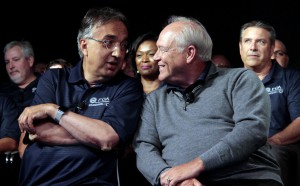A strike could be looming in the near future for Fiat Chrysler Automobiles, now that 40,000 workers represented by the United Auto Workers Union have rejected the carmaker’s tentative contract.
The UAW announced the results after the last major FCA assembly plant, in Sterling Heights, Michigan, turned thumbs down on the controversial agreement, which had generated widespread criticism by union activists. Almost 70% of the workers in Sterling Heights rejected the four-year proposal, according to a website run by the union local.
The announcement comes as a major setback for UAW leaders, especially new President Dennis Williams who was overseeing his first round of national contract talks. The question now is whether the UAW can go back and renegotiate improvements to the agreement without a confrontation. Going into this year’s auto talks, Williams had said he would be willing to strike, if necessary, but said he would consider that possibility a “failure.”
A number of key UAW plants rejected the proposed contract which was negotiated two weeks ago. It would have delivered a $3,000 signing bonus and the first pay hikes in a number of years. But it was also criticized for not ending the lower-wage, second-tier system established in 2007 for newly hired employees.
“I feel like the people who hire in at the lower wage deserve the chance to get to where I’m at, to be able to live in a comfortable manner,” said Nancy Collins, a team leader at Kokomo Transmission in Indiana, told Labor Notes, an organization run by grass-roots union activists.
When she started at Chrysler 20 years ago, Collins was a single mom supporting three young kids. Today her daughter and son-in-law, with three kids of their own, work at the plant too. But “how they make it on $19 an hour I’m not real sure, and that’s with both of them working,” Collins said. “They live paycheck to paycheck…. They do the same jobs we do. There’s no reason they should be paid so much less.”
Workers apparently also were disappointed in FCA’s plan to move some small car assembly operations to Mexico, even though the automaker agreed to bring to the U.S. production of some bigger, higher-priced truck models.
(Click Here for more details about the now-rejected deal between FCA and the UAW.)
Rejection of the pact was particularly decisive at the Jeep complex in Toledo, Ohio where more than 80% of the workers voted against the contract. Many have said they felt they were sold out by FCA CEO Sergio Marchionne, who threatened to reward their work by pulling a key product, the Jeep Cherokee, out of the complex.
But the rejection of the agreement also comes as a rebuke to UAW President Williams and his negotiating team. And it puts them under pressure to quickly renegotiate the now-rejected pact which was hammered out hours after the official midnight September 15th deadline.
The UAW is expected to formally announce the results of the voting on Thursday, and it likely then will lay out the next steps it plans to take. It is unclear if any work stoppage could follow, though it does not appear that the union’s leaders are ready to rush to the picket lines.
Another question left in the air is what the setback at Fiat Chrysler will mean. The UAW actually has to negotiate separate contracts with all three of the Detroit-based automakers. It followed its traditional strategy of focusing on one maker as it approached the mid-September deadline, hoping to come up with an agreement that would eventually be used as a pattern for settlements with Ford and General Motors.
But things could be getting rough even though the national contract talks with those two companies have been put on the back burner.
Along with the national agreements, union leaders must negotiate separate settlements on a plant-by-plant basis, and talks at a key Ford assembly plant producing the maker’s high-profit F-150 pickup have hit a snag. Jimmy Settles, the UAW vice president heading Ford negotiations, has warned that could lead to a strike at that factory in the coming week.
(For more on the apparent impasse at the Ford F-150 plant, Click Here.)
Going into this year’s negotiations, Williams had hoped to set a tone of labor-management cooperation, but the stumbles at FCA and Ford may be an indication that workers aren’t ready to cooperate with their own leaders. What that means next could become apparent within the next several days.
(Paul A. Eisenstein contributed to this report.)


Maybe this time the UAW will act with more respect for new hires, place a cap on the qty. of part time hires who get essentially no benefits and adjust the hourly rate so it’s more realistic than what fast food workers now receive in several locales.